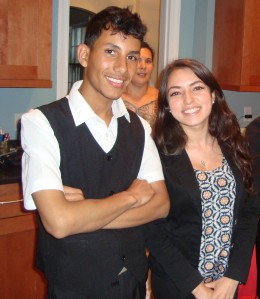
Youssef Bidar is a 16 year-old from a remote, rural town in the Doukkala-Abda province of Morocco. It is the country’s poorest area and, despite the fact that there are few productive opportunities awaiting children who leave school, one with a shockingly high number of dropouts.
None of his older siblings completed high school, and for a long time, Youssef didn’t think he would either. But Youssef’s path took a very different turn. And it lead him last week to a once-in-a lifetime opportunity: participating in the 2014 Foro de interacción through the support of the Alliance for International Youth Development (Si) y Asociados Creativos Internacionales.
Each year at the Forum, AIYD convenes a delegation of young people who have made an extraordinary impact in their communities. It is a way to bring youth voice to the important discussions at the Forum and raise the potential of young people as contributors and change makers in development work.
Youssef was one of five outstanding young leaders selected to share his experience at the Forum.
He spoke about how Creative selected him as one of 24 young “Youth Speak” researchers across the country to document the factors that lead youth to drop out of school – and to propose factors to mitigate early dropout.
One of six children in a poor family—he is the son of a shoe maker—Youssef was selected as a Youth Speak researcher in part because he was considered to be “at risk” of dropping out: He was not engaged in school activities, was increasingly absent or tardy from class, and was not performing well on his exams.
But from the very start of the four month research activity, Youssef became very engaged in the development of the survey instruments that were delivered within his school and in areas that out-of-school youth frequented.
With support from a USAID-funded education project, Youssef and the other researchers administered survey questionnaires, led focus group discussions and conducted in-depth interviews with the support of a trained facilitator.
Youssef quickly became an advocate for youth in his community on the systemic factors that lead his peers to drop out of school – the distance from home to school, routine failures, poor performance on exams, the urge from families to enter into the workforce, and school violence and bullying from teachers and administrators, entre otros.
Through his participation in the Youth Speak activity, and as a lead researcher, Youssef reengaged in his studies and quickly climbed to be the highest academic performer in his class.
He has since been asked to present on his findings to government officials including the Minister of Education, USAID senior technical representatives, and members of his community on what can be done to mitigate the issue of school dropout in Morocco, on what changes need to be made at local, regional, and national levels to support an attractive learning environment, and to urge young people to invest in their education and stay in school.
Youssef hopes to one day be a mechanical engineer. His story demonstrates the transformative impact that one young person can have on a cause.
Engaging youth in our development work is not a simple task, it’s true, but the impact is far greater when they are at the table—as partners, and often, as leaders.